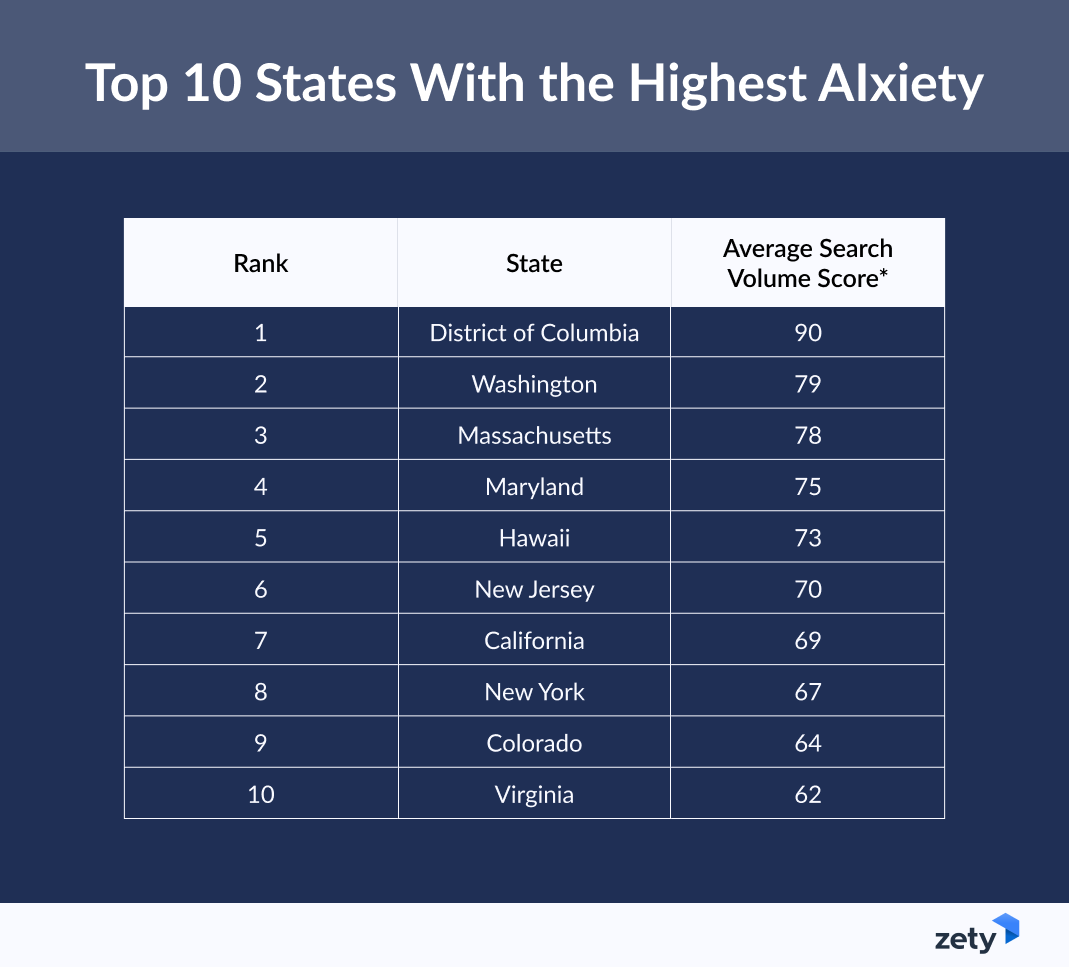
AI is transforming jobs at a remarkable pace, and it’s sparking plenty of anxiety along the way. In Zety’s latest AIxiety Across America Report, a year’s worth of U.S. Google Trends data was analyzed to explore the rise of what its experts are calling “AIxiety”—heightened job fears and career concerns related to AI.
Researchers examined eight of the top and fastest-rising Google searches in two key areas: AI-driven job loss (“AI taking jobs,” “AI layoffs,” “AI impact on jobs,” “AI unemployment”) and professional development for an AI-driven workforce (“Certificate in AI,” “AI certification,” “AI skills,” “AI course”). The average search volume score for each state was then calculated across these terms between September 16, 2024, and September 16, 2025.
By identifying the states with the highest interest and concern—and where workers are most motivated to future-proof their careers—the data offers a clear snapshot of where AI anxiety is felt the strongest in the U.S.
Key findings:
- Tech/government hubs rank highest: D.C. (1), Washington (2), and Massachusetts (3) lead.
- East Coast concentration: Massachusetts (3), New Jersey (6), and New York (8) join D.C. in the top 10.
- Beyond traditional hubs: Hawaii (5) cracks the top five, showing broad, cross-regional interest.

*Google Trends measures relative popularity, not absolute search volume. Average scores are rounded to the nearest whole number.
Research Insights
The data reveals a broadening landscape of anxiety about AI across the U.S. Residents in tech and policy hubs like D.C., Washington, Massachusetts, California, and New York show the highest levels of AIxiety, reflecting their proximity to AI development and regulation.
Hawaii is a striking outlier: Despite not being a tech hub, it ranks among the most anxious states, likely due to its dependence on tourism, sensitivity to outside economic shifts, and concerns about preserving cultural identity in the face of disruptive technologies.
In short, where AI feels close and consequential, nerves run high, and Hawaii’s unique context helps explain why its residents share those heightened anxieties.
Complete Ranking: How All U.S. States Compare
|
Rank |
State |
Average Search Volume Score |
|
1 |
District of Columbia |
90 |
|
2 |
Washington |
79 |
|
3 |
Massachusetts |
78 |
|
4 |
Maryland |
75 |
|
5 |
Hawaii |
73 |
|
6 |
New Jersey |
70 |
|
7 |
California |
69 |
|
8 |
New York |
70 |
|
9 |
Colorado |
64 |
|
10 |
Virginia |
62 |
|
11 |
Connecticut |
57 |
|
12 |
Texas |
56 |
|
T-13 |
Georgia |
53 |
|
T-13 |
Illinois |
53 |
|
T-15 |
Arizona |
52 |
|
T-15 |
Oregon |
52 |
|
17 |
North Carolina |
51 |
|
T-18 |
Nevada |
50 |
|
T-18 |
Utah |
50 |
|
T-20 |
Rhode Island |
49 |
|
T-20 |
Pennsylvania |
49 |
|
22 |
Minnesota |
47 |
|
23 |
Tennessee |
45 |
|
24 |
Florida |
44 |
|
25 |
Kansas |
43 |
|
T-26 |
Wyoming |
42 |
|
T-26 |
Michigan |
42 |
|
T-28 |
South Carolina |
41 |
|
T-28 |
Ohio |
41 |
|
T-30 |
Alabama |
40 |
|
T-30 |
Montana |
40 |
|
T-32 |
Missouri |
39 |
|
T-32 |
Louisiana |
39 |
|
T-32 |
Arkansas |
39 |
|
T-35 |
Indiana |
38 |
|
T-35 |
Kentucky |
38 |
|
T-35 |
Mississippi |
38 |
|
T-35 |
Iowa |
38 |
|
39 |
Delaware |
37 |
|
40 |
Wisconsin |
36 |
|
41 |
Vermont |
35 |
|
42 |
Alaska |
33 |
|
43 |
Nebraska |
32 |
|
T-44 |
New Mexico |
31 |
|
T-44 |
New Hampshire |
31 |
|
T-46 |
Oklahoma |
30 |
|
T-46 |
Idaho |
30 |
|
48 |
West Virginia |
29 |
|
49 |
Maine |
26 |
|
T-50 |
North Dakota |
21 |
|
T-50 |
South Dakota |
21 |
What’s Driving AIxiety?
Various factors are intensifying worries about AI’s role in the workforce:
- Publicized AI-related layoffs: Announcements from companies like Salesforce, Fiverr, and Microsoft have heightened the fear of AI replacing jobs.
- Rapid AI adoption: Companies are implementing automation and AI tools at unprecedented speed, changing job responsibilities.
- Industry exposure: Workers in tech, finance, government, and research-heavy regions are directly experiencing AI-driven shifts.
- Skill gaps: Many employees feel unprepared for new AI-related demands and are seeking training or certifications.
For employers, policymakers, and educators, these insights provide a roadmap for understanding which regions may need targeted workforce support, upskilling programs, and guidance as AI continues to reshape the labor market.
Workers can use these insights to pursue AI-proof careers and stay ahead in a changing job market.
For press inquiries, contact Skyler Acevedo, Public Relations Specialist, at skyler.acevedo@bold.com.
Methodology
Zety researchers analyzed Google Trends to identify which U.S. states show the greatest search interest in AI job loss concerns and preparation for the future impact of AI, reflecting AIxiety.
- Keyword selection: Eight search terms were chosen based on popularity and breakout queries in two key areas: AI-driven job loss (“AI taking jobs,” “AI layoffs,” “AI impact on jobs,” “AI unemployment”) and professional development for an AI-driven workforce (“Certificate in AI,” “AI certification,” “AI skills,” “AI course”).
- Data collection: Search data for each term was compiled across all states, including Washington D.C., from September 16, 2024, to September 16, 2025. The District of Columbia is included as a U.S. state for a comprehensive national view.
- Scoring: Google Trends measures relative popularity, not absolute search volume. For each search term, a state is assigned a score from 0 to 100, indicating the relative popularity of that term compared with other states over the selected time period. A score of 100 represents the state with the highest search interest for that term, while a score of 0 means there was not enough data to register significant interest. For this analysis, each state’s scores across all eight terms were averaged to create a single composite number.
- Ranking: States were then ranked by their average composite scores, capturing overall search interest and potential concern about AI’s impact on jobs and the workforce.
About Zety
Zety resume templates and Zety's Resume and Cover Letter Generator are trusted by 12 million users each year. With 100s of options to choose from, including professionally designed resume templates to beat the ATS, users can create a professional resume in less than 15 minutes. Since 2016, Zety’s career blog has provided free data-driven insights to over 40 million readers annually, empowering professionals at every stage. The editorial team includes Certified Professional Resume Writers, with the best career advice and evidence-based findings featured in Business Insider, CNBC, and Forbes, among others. Follow Zety on Facebook, LinkedIn, YouTube, X, and Instagram for free expert career tips and updates.


